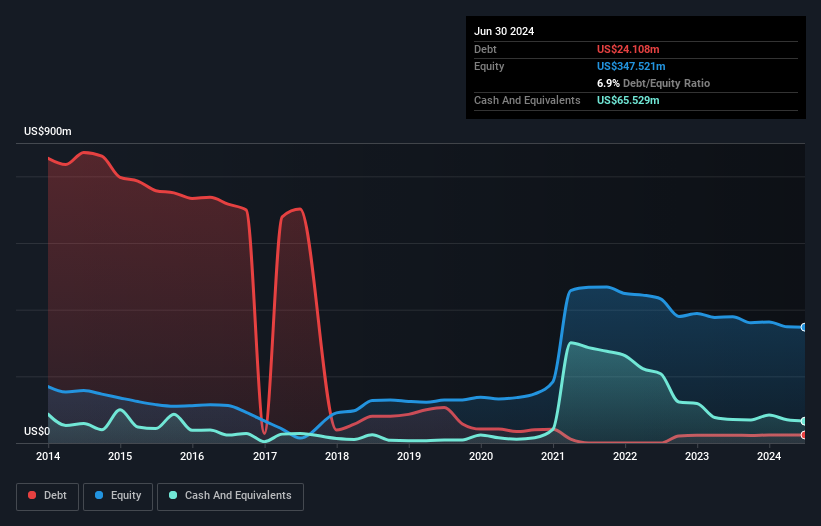
Warren Buffett famously said, 'Volatility is far from synonymous with risk.' It's only natural to consider a company's balance sheet when you examine how risky it is, since debt is often involved when a business collapses. We can see that Emeren Group Ltd (NYSE:SOL) does use debt in its business. But is this debt a concern to shareholders?
When Is Debt Dangerous?
Debt assists a business until the business has trouble paying it off, either with new capital or with free cash flow. If things get really bad, the lenders can take control of the business. However, a more frequent (but still costly) occurrence is where a company must issue shares at bargain-basement prices, permanently diluting shareholders, just to shore up its balance sheet. By replacing dilution, though, debt can be an extremely good tool for businesses that need capital to invest in growth at high rates of return. When we examine debt levels, we first consider both cash and debt levels, together.
View our latest analysis for Emeren Group
What Is Emeren Group's Debt?
The chart below, which you can click on for greater detail, shows that Emeren Group had US$24.1m in debt in June 2024; about the same as the year before. But it also has US$65.5m in cash to offset that, meaning it has US$41.4m net cash.

How Healthy Is Emeren Group's Balance Sheet?
The latest balance sheet data shows that Emeren Group had liabilities of US$51.0m due within a year, and liabilities of US$59.2m falling due after that. Offsetting this, it had US$65.5m in cash and US$76.5m in receivables that were due within 12 months. So it actually has US$31.8m more liquid assets than total liabilities.
This luscious liquidity implies that Emeren Group's balance sheet is sturdy like a giant sequoia tree. With this in mind one could posit that its balance sheet means the company is able to handle some adversity. Succinctly put, Emeren Group boasts net cash, so it's fair to say it does not have a heavy debt load! The balance sheet is clearly the area to focus on when you are analysing debt. But it is future earnings, more than anything, that will determine Emeren Group's ability to maintain a healthy balance sheet going forward. So if you're focused on the future you can check out this free report showing analyst profit forecasts.
Over 12 months, Emeren Group reported revenue of US$104m, which is a gain of 7.6%, although it did not report any earnings before interest and tax. That rate of growth is a bit slow for our taste, but it takes all types to make a world.
So How Risky Is Emeren Group?
We have no doubt that loss making companies are, in general, riskier than profitable ones. And we do note that Emeren Group had an earnings before interest and tax (EBIT) loss, over the last year. And over the same period it saw negative free cash outflow of US$20m and booked a US$17m accounting loss. While this does make the company a bit risky, it's important to remember it has net cash of US$41.4m. That means it could keep spending at its current rate for more than two years. Overall, its balance sheet doesn't seem overly risky, at the moment, but we're always cautious until we see the positive free cash flow. The balance sheet is clearly the area to focus on when you are analysing debt. However, not all investment risk resides within the balance sheet - far from it. For instance, we've identified 2 warning signs for Emeren Group (1 doesn't sit too well with us) you should be aware of.
At the end of the day, it's often better to focus on companies that are free from net debt. You can access our special list of such companies (all with a track record of profit growth). It's free.
Valuation is complex, but we're here to simplify it.
Discover if Emeren Group might be undervalued or overvalued with our detailed analysis, featuring fair value estimates, potential risks, dividends, insider trades, and its financial condition.
Access Free AnalysisHave feedback on this article? Concerned about the content? Get in touch with us directly. Alternatively, email editorial-team (at) simplywallst.com.
This article by Simply Wall St is general in nature. We provide commentary based on historical data and analyst forecasts only using an unbiased methodology and our articles are not intended to be financial advice. It does not constitute a recommendation to buy or sell any stock, and does not take account of your objectives, or your financial situation. We aim to bring you long-term focused analysis driven by fundamental data. Note that our analysis may not factor in the latest price-sensitive company announcements or qualitative material. Simply Wall St has no position in any stocks mentioned.
About NYSE:SOL
Flawless balance sheet with high growth potential.
Similar Companies
Market Insights
Community Narratives



